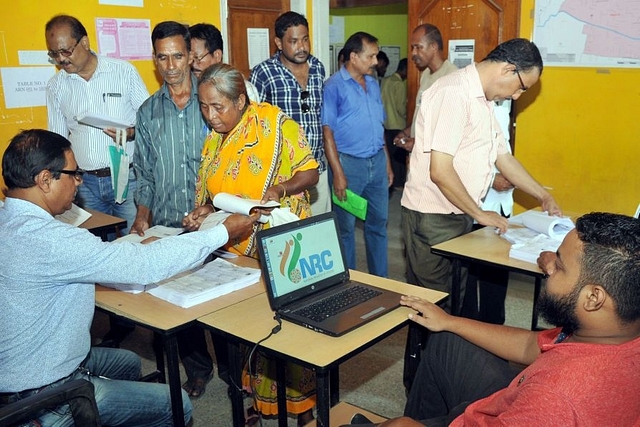
BJP-AGP Alliance For LS Polls Shouldn’t Mean Quiet Burial For Citizenship Bill
The only thing worth doing is disenfranchisement, so that the illegals, including many Islamists, do not become a fifth column in our political process.
After the rift over the Citizenship Amendment Bill, the Asom Gana Parishad (AGP) is back in an alliance with the Bharatiya Janata Party (BJP) for the Lok Sabha polls. For the BJP, which wants to make major gains in the northeast in the forthcoming Lok Sabha polls, this alliance is crucial.
You can also read this article in Hindi- भाजपा-असोम गण परिषद की संधि से नागरिकता संशोधन विधेयक पीछे नहीं छूटना चाहिए
What is not clear is whether there is some tacit understanding with the AGP and the Bodoland People’s Front, which were miffed with the BJP after the bill was passed by the Lok Sabha, that it will be quietly dumped or brought back in an amended form after the polls to assuage the Assamese.
The big mistake made by the BJP was to ham-handedly try and push the bill at the eleventh hour without any explanation to its alliance partners in Assam or offering clear reasoning to the state’s people. Worse, the bill was badly timed as the process initiated under the National Register of Citizens (NRC) to identify and deport illegal immigrants is still a work in progress. The contradictory messaging, where the party president was promising the deportation of illegal immigrants from Assam, and the Citizenship Amendment Bill attempting to fast-track citizenship for persecuted minorities from neighbouring countries, obviously did not go down well. The bill specifically names Hindus, Buddhists, Sikhs, Jains and Christians as among the refugees entitled to quick citizenship.
But it would be a pity if the bill were to be unceremoniously dumped, or amended too much to keep Hindu illegals from Bangladesh out of its ambit. The bill is vital not only to assure persecuted Hindus fleeing Bangladesh that they still have a home, but also to send the same message to oppressed Hindu refugees from Pakistan and Afghanistan who are overstaying their tourist visas.
The BJP has a tricky task in reconciling Assamese interests, where the sentiment favours deportation of all illegals entering the state after 1971, and the party’s own political interests in parts of Bengali-dominated Assam and West Bengal, where support for the bill is much higher.
Politically, the bill is vital for the BJP’s growth in West Bengal, where a significant number of Hindu refugees have found temporary shelter.
The BJP cannot wish away this contradiction any more than it can afford to abandon the persecuted Hindus pouring over from across the Bangladesh borders.
The way forward should include these three components, as suggested earlier in Swarajya.
One, the bill should be timed for reintroduction after the NRC process in Assam is completed by July 2019, and the illegals identified.
Two, once the illegals are identified, those eligible for special treatment and fast-tracking of citizenship – that is, Hindus and other minorities fleeing persecution or intimidation in Bangladesh – should be offered a road to citizenship.
Third, a large chunk of those eligible for citizenship and now resident in Assam should be offered finance and concessions to move base to five or six other states so that Assam’s burden is significantly reduced.
The rest of the illegals should be disenfranchised, and, if possible, deported. The right to citizenship needs to be differentiated from the right to receive temporary work permits in India. Perhaps, the Indo-Nepal treaty, which allows the Nepalese to seek work and move freely in India, can be extended to Bangladesh. Under Article 7 of the 1950 Indo-Nepalese treaty of friendship, the governments of India and Nepal agreed to “grant, on a reciprocal basis, to the nationals of one country in the territories of the other the same privileges in the matter of residence, ownership of property, participation in trade and commerce, movement and other privileges of a similar nature.”
There is no reason why this kind of treaty cannot be extended to Bangladesh in order to allow its nationals to work and reside in India (and vice-versa), but without the right to acquire citizenship except as specified under the Citizenship Amendment Bill. The only thing we need to do differently with Bangladesh is to formally ask its nationals to seek work permits before entering India. It cannot be a free-for-all without documentation of work permits.
What is a pipedream is for India and the Assamese to pretend that millions of illegals can just be deported, when Bangladesh is unwilling to accept them back.
The only thing worth doing is disenfranchisement, so that the illegals, including many Islamists, do not become a fifth column in our political process.